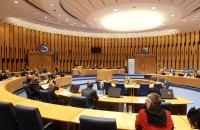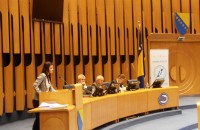 After the promotions of the Nordic model of cooperation held in Belgrade, Podgorica, Sarajevo, and Zagreb, Igman Initiative organized a consultation meeting on February 18th 2013 in Sarajevo with representatives of foreign policy boards, offices for EU integrations and parliamentary friendship groups from Dayton Agreement countries. Purpose of this meeting was to organize parliamentarians to devise concrete propositions focused on spheres and types of cooperation which have the priority at this moment, as well as to provide those propositions to the expert group that works on the model of improvement of inter-parliamentary cooperation between the four countries based on Nordic experiences. During his welcoming address, Bozo Ljubic, President of the Home of Representatives at the Parliamentary Assembly of Bosnia and Herzegovina, pointed out a number of reasons why intensification of inter-parliamentary cooperation is necessary, among which addressing outstanding issues and overcoming burdens inherited from the events of the recent past are very important. He welcomed the efforts of Igman Initiative to gather parliamentarians around this sort of idea based on experiences from the most developed countries in Europe. He also listed a number of spheres where cooperation can and should be intensified: succession, citizens’ status and property issues resulted from the break-up of former Yugoslavia, protection of environment and reinforcement of traffic infrastructure.
After the promotions of the Nordic model of cooperation held in Belgrade, Podgorica, Sarajevo, and Zagreb, Igman Initiative organized a consultation meeting on February 18th 2013 in Sarajevo with representatives of foreign policy boards, offices for EU integrations and parliamentary friendship groups from Dayton Agreement countries. Purpose of this meeting was to organize parliamentarians to devise concrete propositions focused on spheres and types of cooperation which have the priority at this moment, as well as to provide those propositions to the expert group that works on the model of improvement of inter-parliamentary cooperation between the four countries based on Nordic experiences. During his welcoming address, Bozo Ljubic, President of the Home of Representatives at the Parliamentary Assembly of Bosnia and Herzegovina, pointed out a number of reasons why intensification of inter-parliamentary cooperation is necessary, among which addressing outstanding issues and overcoming burdens inherited from the events of the recent past are very important. He welcomed the efforts of Igman Initiative to gather parliamentarians around this sort of idea based on experiences from the most developed countries in Europe. He also listed a number of spheres where cooperation can and should be intensified: succession, citizens’ status and property issues resulted from the break-up of former Yugoslavia, protection of environment and reinforcement of traffic infrastructure.
By taking part in the discussion, presidents and representatives of parliamentary boards for foreign affairs also gave their contribution to the process of devising models of inter-parliamentary cooperation that will fit our conditions.
“We came here to share our thoughts with Igman Initiative in a less formal way, i.e. to broaden the circle of people who take part in this discussion and find a common tongue of communication with the non-governmental sector” – Mirza Kusljugic, President of the Foreign Affairs Commission of the House of Representatives at the Parliamentary Assembly of Bosnia and Herzegovina, pointed out. Idea to operate through the parliaments comes from the fact that parliaments gather both position and opposition and represent the continuity of cooperation, which is different from the executive government that remains susceptible to sometimes drastic and radical changes after the elections. It was decided to go public with concrete projects that include parliaments as initiators of the process or as venues where time-frames for completion and initiation of process will be decided. In this sense, for example, our concrete goal would be to conclude and ratify an agreement on borders that tears down borders in our minds, which is a lengthy process, Kusljugic suggested.
During his speech on behalf of the delegation of Montenegro, Miodrag Vukovic, President of the Committee on International Relations and Emigrants at the Parliament of Montenegro commended the efforts of Igman Initiative in the process of building new relations between the parliaments of the four countries, while pointing out that new initiatives should never stop or impede already functional channels of cooperation between parliaments and countries of the region that proved good in practice, including bilateral and those that are a part of broader regional initiatives, such as CEI and other similar initiatives. Reality that we live and real processes in our countries and between our countries must not be ignored. We come from countries which are tired of political, economic and social transition and where consequences of war can still be felt. We are also weary of EU demands to conform with standards which would make us acceptable to the EU, while suffering strongly from internal problems in our countries, Vukovic said. He also pointed out that all the aforementioned constitutes the reality of the ambiance we came from, as well as that we are not living a virtual life or a life of desires, but a life of objective reality instead. Therefore, in all our good intentions we must not ignore all those objective facts and wonder off in our quests, in our good intentions reflected by this initiative as well. This warning does not mean that we should not embark on intensification of inter-parliamentary cooperation, but that all those efforts must take into account the reality within which we make moves during the realization of this good idea.
Marija Obradovic, vice-president of the Committee on International Relations at the People’s Assembly of the Republic of Serbia, pointed out the fact that these countries are not connected only by shared past and similar behavioral patterns, but also by interests and a need to jointly seek solutions. Bilateral and multilateral cooperation, above all on the level of parliaments, had shown that the agreement on the minimum of shared interests should provide us with the opportunity to have our voices heard further and understood better. In order to achieve that, we must break off from the past where those who thrive on our political and economic isolation want to keep us locked, Marija Obradovic said.
During his welcoming speech, H. E. Swedish Ambassador Bosse Hedberg warmly thanked the hosts of the meeting for their invitation to present the so called “Nordic model”, examples of cooperation and Nordic Council’s joint approach toward other groups, associations of countries or international organizations and institutions. Swedish Ambassador emphasized the role of official government institutions, especially the role of parliamentarians as bearers of legislative powers in the process of regional cooperation. He also pointed out that during the course of his five-year mandate in Bosnia and Herzegovina he saw many times how important decisions were being brought outside of government institutions in Bosnia and Herzegovina, outside of the Parliament and the Government, as well as without participation of civil society organizations and the non-governmental sector, which is unfortunate because civil society organizations and the civil sector are able to provide very valuable contributions with their good solutions.
Co nsultation meeting was moderated by Vehid Sehic and Aleksandar Popov, co-presidents of Igman Initiative for Bosnia and Herzegovina and Serbia, together with Zlatko Dizdarevic, expert hired on the project.
nsultation meeting was moderated by Vehid Sehic and Aleksandar Popov, co-presidents of Igman Initiative for Bosnia and Herzegovina and Serbia, together with Zlatko Dizdarevic, expert hired on the project.
During the discussion that followed after these speeches, a number of concrete suggestions were offered for spheres where inter-parliamentary cooperation could be intensified by application of Nordic experiences. In conclusion, Branko Lukovac, co-president of Igman Initiative in Montenegro, listed the most important spheres among those that were proposed:
- Having in mind the forthcoming Croatia’s accession to the EU (which is also a positive development for other countries of this region), intensification of inter-parliamentary cooperation should aim at preservation and improvement of accomplishments achieved thus far in the field of free movement of people, not only in the sense of maintaining visa-free regime, but also by free movement of labor force supported by harmonized national legislation that regulates this field,
- Economic cooperation is one of the fields that can be encouraged by greater or smaller government incentives. However, because of the important role of this field in the process of normalization and improvement of overall international relations, enhanced joint engagement of parliaments may be a contribution to this cooperation by means of abrogation of current more or less visible barriers in this respect.
- Having in mind the great interdependence and connection between these countries’ energy systems, as well as construction of new capacities in this field, energy sphere may become one of the future fields where inter-parliamentary and inter-governmental cooperation should be improved.
- Protection of environment in contemporary circumstances is certainly a field of great joint interest to which improvement of inter-parliamentary cooperation may give a new impetus and institutionalization of full and open cross-border cooperation in the struggle against natural disasters, such as wild fires, floods and other, would also be desirable.
- Four Dayton Agreement countries have a shared cultural heritage, which is a fact that needs to be used as a connecting agent contributive to mutual understanding. That is why this may become a resource which can be improved much more through intensified inter-parliamentary cooperation in this field focused on improvement of overall mutual relations.
On the basis of these suggestions, expert group of the Igman Initiative will make a report with recommendations, which is going to be presented at the meeting of the four parliaments’ vice-presidents scheduled for late March or early April in Belgrade, with Nebojsa Stefanovic, President of the Parliament of the Republic of Serbia as a host the meeting.

